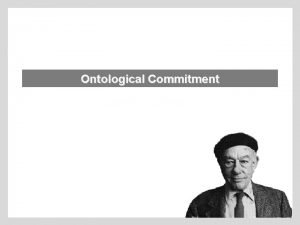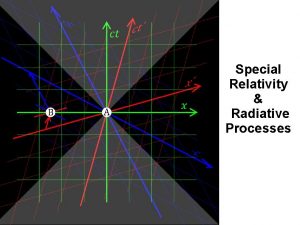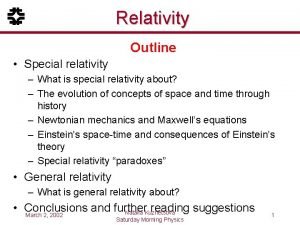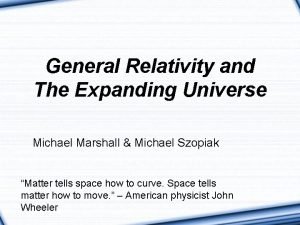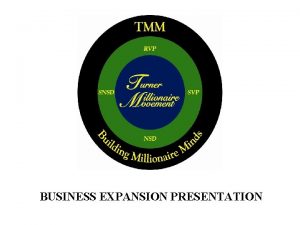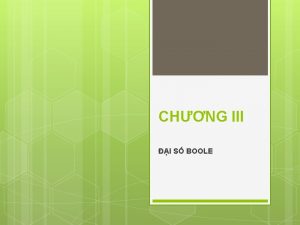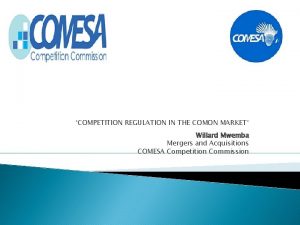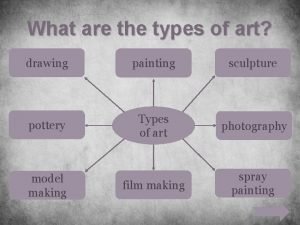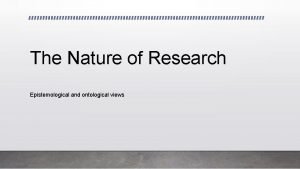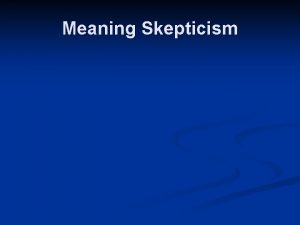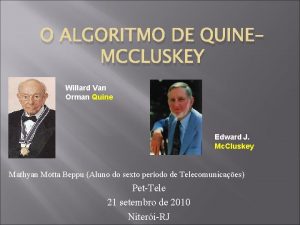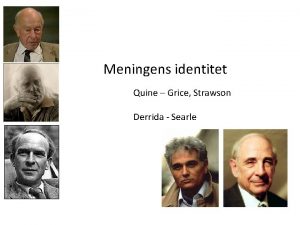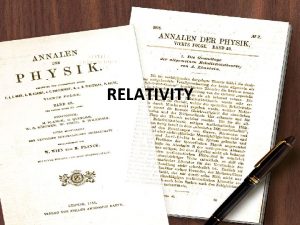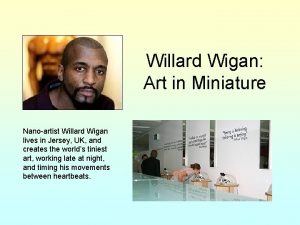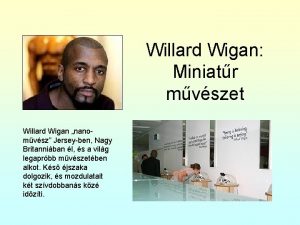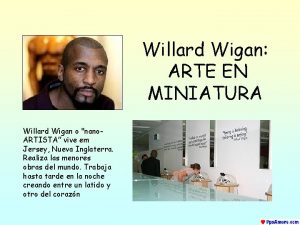Quine and ontological relativity Quine Willard van Orman












- Slides: 12

Quine and ontological relativity Quine Willard van Orman (1908 – 2000) American philosopher (Harvard) Language cannot be divided to “atoms”, it works only in its complexity (holism). E. g. , to be …. is only a role in structured wholeness (e. g. , goalkeeper) Difference between analytic and synthetic statements (logical propositions) is not absolute and should be dropped If a statement is analytic, then it is true by definition. (Bachelors are unmarried. Daisies are flowers. ) Because of this, analytic statements are essentially uninformative tautologies. If a statement is synthetic, its truth value can only be determined by relying upon observation and experience. Its truth value cannot be determined by relying solely upon logic or examining the meaning of the words involved. (All men are arrogant. ) The information in the predicates (arrogant) are not contained already in the subjects (all men). “All crows are black. ” 1

Ontological relativity It has no sense to tell how are subject of some theory absolutely, it is only possible to explain how one theory of subjects is interpreted in another theory… Any individual statement (proposition) can not be confirmed or disconfirmed, in the play is the whole theory (system, discourse) Any statement can be keep true if we do enough drastic changes in the system. „To ask how is reality actually is selfcontradictionary. It is the same like to ask how long is the river Nile, without reference to specific affairs of miles and metres. “ “Reglementation” (purification) of language 2

Philosophy of mind – the key branch of analytical philosophy Can machines think? A. Turing Computing Machinery and Inteligence (1950) What it means „to think“? Turing test (TT) – dialog between „machine“ and man, thinking – ability to cheat (trick) Cognitive science Weisbaum “Elisa” John Searle – “Chinese room” (1984) biologism (thinking is something like digestion), machines can have syntax, no semantics (meaning of symbols, no representation) Ned Block (1942) (article Psychologism and Behaviourism -1981) It is important how is pass TT Roger Penrose – from Gödel theorem (? ), no algorithmic function of brain (no determination? ) 3

Defence of TT: We all ponder in this way! Legitimate extrapolation of the concept of „thinking“ Daniel Denett (1996) – theory of stances, similar to “perspektivism” (developed by Friedrich Nietzsche. All ideations take place from particular perspectives. There are many possible conceptual schemes, or perspectives in which judgment of truth or value can be made. No way of seeing the world can be taken as definitively "true“. (But does not necessarily entail that all perspectives are equally valid. ) • Physical perspective • Design perspective • Intentional perspective (having wishes, intentions) Important is consciousness “God (spirit, ghost, soul) in us” (Anaxagoras, Augustine, … P. Russell) Quantum phenomena(? ) (indeterminism? , freedom? ) Controversy: dualism (Pythagoras, …Descartes …) x monism (atomists, . . ) Division mental x neural (stance, languages) 4

Funkcionalism (driller x rod, book – calendar) From functional viewpoint, mind is a black box with some function T. Nagel How is it to be a bat? “Science of consciousness made from first person perspective … has no methods, data … will still remain fantasy. ” David Chalmers (Australian philosopher, b. 1966) Post analytical philosophy Richard Rotry (1931 -2007): …things are not represented by language, but created… Language is set of instruments for achievement of something … 5

Soul and Body (and analytical philosophy) 6

Dualism and monism Body x mind → soul? Formation of dualism mythology – Amor and Psyché Milesian philosophers – principle of motion Pythagoreans – soul (PSYCHÉ) principle of individuality, metempsychosis Empedocles (5 th cent. BC) (had been girl, bush…) Plato (4 th cent. BC) – live of soul (metempsychosis) 3 parts of soul (team of horses): 1 reason, 2 passions, 3 will Aristotle (4 th cent. BC) (principle of life) – 3 souls nourishing, experiencing, rational Nefesh → influence of Neo-Platonism → soul 7

Living and non living bodies (distinguished in Czech) Descartes (1596 -1650) Clear opposites, incommensurability, problem of interconnection of soul (mind) and body: -----------------------------------a – the world of bodies is closed, nothing no corporal influences it, explicable from itself b – the world of mind (psychological, mental states, processes, dispositions, attributes …) no corporeal, closed – independent world of mind (illusion? ) c – stated and processes of mind – causes of some corporeal states, processes, changes -------------------------------a- and b - is not possible to proof (and disproof), metaphysical theses Berkeley (1685 -1753) Nissargadatta (1897 -1981): “all there is is consciousness” c- empirical assertion (possible falsification) 8

→ three concepts Psychophysical materialism (a and c, non b) (mind has corporeal nature – old atomists, mind is illusion) 1. Dualism – non a: body is mind, body is illusion 2. Epifenomenalism, psychophysical parallelism, non c. (mind is caused by corporeal changes) Epiphenomenon (epi-phainó, to appear on something) is phenomenon that can have case, but do not cause anything. Secondary phenomenon. Paralelism: between mind and body is no causal interconnection, in both proceed the same causal processes, Nicolas Malabranche (1638 -1715)– no interaction – God arranged that physical and mental processes proceed simultaneously Baruch Spinoza (1632 -1677), “occasionalism”, dualism of qualities, “theory of double aspect”- some causes have both physical and mental aspect 9

“neutral monism” amended E. Mach → B. Russell: Mind and body – no independent entities, but appropriate ways of ordering events Model: wave - corpuscular dualism of quantum mechanics relation sense – reference in Frege´s terminology 10

Main theses: mind = behaviour (behaviourism) = part of brain (psychophysical identity) = program (functionalism) = phenomenal quality fixed to brain = illusion (eliminative materialism) = quality of brain (naturalism) = non-physical entity interacting with brain (interactionism) 11

Gilbert Ryle (1900 -1976), English philosopher, (“tourist in Oxford”) → behaviourism The concept of "mind" is "a philosophical illusion hailing chiefly from Descartes and sustained by logical errors and category mistakes which have become habitual. " Belief that there is polar opposition between mind and body is the belief that both terms are of the same logical type. Gilbert Ryle (The Concept of Mind 1949) Ghost in the machine 12
 Quine ontological commitment
Quine ontological commitment Special vs general relativity
Special vs general relativity Postulates of special theory of relativity
Postulates of special theory of relativity General relativity vs special relativity
General relativity vs special relativity Suze orman primerica
Suze orman primerica Orman kadastrosu
Orman kadastrosu Phương pháp quine mccluskey
Phương pháp quine mccluskey Gordon allport teoria da personalidade
Gordon allport teoria da personalidade Willard scott birthday announcement form
Willard scott birthday announcement form Dallas willard healing the heart
Dallas willard healing the heart Willard mwemba
Willard mwemba Types of art drawing
Types of art drawing Research ontology and epistemology
Research ontology and epistemology
